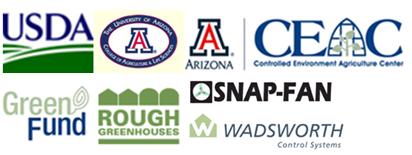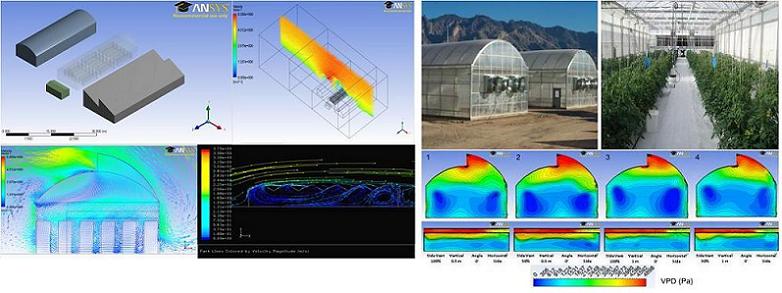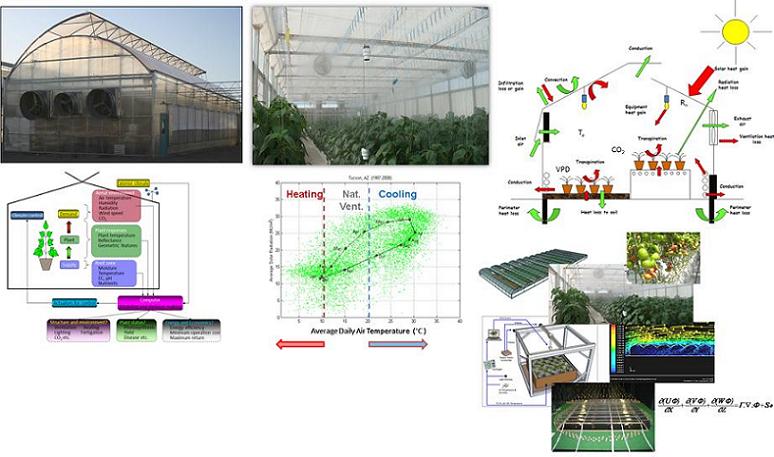
| Murat Kacira, Professor | ||
| Department of Ag. and Biosystems Engineering Shantz Bldg. #38, Rm 504 The University of Arizona, Tucson, AZ 85721 |
Controlled Environment Agriculture Center 1951 E. Roger Rd., Rm 104 The University of Arizona, Tucson, AZ 85719 |
|
| phone: (520) 626-4254 e-mail: mkacira@email.arizona.edu | ||
Novel Remote Crop Diagnostics and Decision Support Systems for CEA
Greenhouse systems can be more resource use efficient if the environmental control system include plant responses measured in real-time in the decision making process. Imaging techniques have potential to identify emerging stresses and to guide sampling for identification of the stressor.
These remote sensing applications are increasingly being applied in the rapidly evolving precision agriculture, which can improve crop production, while being more environmentally friendly than the 'classic' production methods.
Our research focus on design, development and implementation of computer vision guided real time crop health and growth monitoring systems for timely identification of crop status and improved resource use efficiency. We are also developing web based decision support systems enabling operators with remote access to meaningful information on crop and greenhouse system status for improved system operation and decision making.
Our research focus on design, development and implementation of computer vision guided real time crop health and growth monitoring systems for timely identification of crop status and improved resource use efficiency. We are also developing web based decision support systems enabling operators with remote access to meaningful information on crop and greenhouse system status for improved system operation and decision making.
-
Computer vision guided cop diagnostics system watching over lettuce canopy in floating hydroponics system
images/SlideShow/Image09.jpg
-
Computer imaging and plant response based stress detection
images/SlideShow/Image08.jpgGraduate student D. Story is monitoring tomato crop with thermal imaging system

-
Hands on student learning on integrated vision system for crop monitoring
images/SlideShow/Image08a.jpgGraduate student D. Story working on integration of tri-camera (NIR/IR/Color) system

-
images/SlideShow/Image08b.jpg

-
Web based decision support system
images/SlideShow/MVS1.jpgRemote and real time access to crop and greenhouse related information and status


Alternative Energy Integrated Sustainable CEA Systems
Sustainable production systems can help to reduce agricultural production impact, and also make farming systems less susceptible to climate changes. The worlds’ resources such as water, land, fertilizers and energy are becoming scarcer; especially in semi-arid and arid regions. The innovative technology must go beyond increasing yields but include developing appropriate production systems and strategies. Our research includes targeted applications with an off-grid low cost and easily deployable greenhouse crop production system for local, fresh, safer food production for growers located in remote locations, challenged regions, disastrous zones where an immediate access to resources for sustainable crop production is limited.
Our current research in the off-the-grid greenhouse system focuses on 1) Study technical and economical feasibility of an off-grid, low-cost controlled environment crop production system, 2) Determine resource usage/consumption (energy, water, fertilizer, labor) and production outputs (crop yield, energy production), 3) Evaluate effect of plants for the energy demand and dynamics of system, and 4) Determine limitations and capabilities of system and provide recommendations for stakeholders.
Our future directions and interest in alternative energy integrated sustainable greenhouse systems research program include: * Evaluating various transparent and selective PV panels and film as glazing on greenhouse structure, their effect on greenhouse microclimate, the crop, resource use efficiency, and energy conversion efficiencies, * Evaluate solar powered lower cost cooling and heating system alternatives, * Innovative integration of alternative energy systems and CEA technologies for improved resource use efficiency, * Resource re-cycling and re-use in CEA production systems.
Our current research in the off-the-grid greenhouse system focuses on 1) Study technical and economical feasibility of an off-grid, low-cost controlled environment crop production system, 2) Determine resource usage/consumption (energy, water, fertilizer, labor) and production outputs (crop yield, energy production), 3) Evaluate effect of plants for the energy demand and dynamics of system, and 4) Determine limitations and capabilities of system and provide recommendations for stakeholders.
Our future directions and interest in alternative energy integrated sustainable greenhouse systems research program include: * Evaluating various transparent and selective PV panels and film as glazing on greenhouse structure, their effect on greenhouse microclimate, the crop, resource use efficiency, and energy conversion efficiencies, * Evaluate solar powered lower cost cooling and heating system alternatives, * Innovative integration of alternative energy systems and CEA technologies for improved resource use efficiency, * Resource re-cycling and re-use in CEA production systems.


Computational and Experimental Analysis of Greenhouse Aerodynamics
Controlled environments have played an important role in the field of agriculture, allowing the grower to have more control on the climate conditions surrounding the crops. Failure to maintain suitable consistent conditions may lead to a decline in both quality and quantity of the plants and the uniformity of production. It is important to develop proper climate control strategies that work to keep these factors uniform along the greenhouse and within acceptable ranges to guarantee high quality yield. Interactions of the different environmental variables of a greenhouse are complex involving a number of physical and chemical properties of matter that are challenging to model realistically. Our research focus on developing methods of understanding these complex phenomena within controlled environments. We develop and validate 3D Computational Fluid Dynamics (CFD) models to study the aerodynamics of greenhouse systems to improve climate uniformity and offer design recommendations for system manufacturers and growers.

Advanced Greenhouse Climate Control Strategy Development
Advanced climate control strategy is needed to maintain desired climatic conditions and to provide uniform environment within acceptable ranges to guarantee high quality crop production and yield year around in CEA production systems. Our research focus on modeling and analysis of greenhouse and crop energy balance, detailed understanding of crop and greenhouse system interaction, developing advanced climate control algorithms and strategies to optimize the crop growing environments with improved resource use efficiencies.



